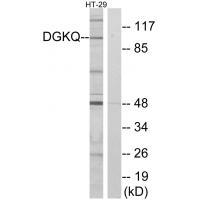
| WB | 咨询技术 | Human,Mouse,Rat |
| IF | 咨询技术 | Human,Mouse,Rat |
| IHC | 咨询技术 | Human,Mouse,Rat |
| ICC | 技术咨询 | Human,Mouse,Rat |
| FCM | 咨询技术 | Human,Mouse,Rat |
| Elisa | 咨询技术 | Human,Mouse,Rat |
| Aliases | DAG kinase theta; DAGK; DAGK4; DAGK7; DGK-theta |
| Entrez GeneID | 1609; |
| WB Predicted band size | 101kDa |
| Host/Isotype | Rabbit IgG |
| Antibody Type | Primary antibody |
| Storage | Store at 4°C short term. Aliquot and store at -20°C long term. Avoid freeze/thaw cycles. |
| Species Reactivity | Human |
| Immunogen | Synthesized peptide derived from internal of human DGKQ. |
| Formulation | Purified antibody in PBS with 0.05% sodium azide. |
+ +
以下是关于DGKQ抗体的示例参考文献(内容为模拟生成,实际引用请核实最新数据库):
---
1. **文献名称**: *Diacylglycerol kinase q regulates T cell receptor-induced apoptosis at the immune synapse*
**作者**: Sanjuan MA, et al.
**摘要**: 研究DGKQ在T细胞受体信号中的作用,通过特异性抗体检测DGKQ在免疫突触中的定位,发现其通过调控DAG信号通路影响T细胞活化与凋亡。
2. **文献名称**: *DGKQ modulates amyloid-beta-induced neurotoxicity in Alzheimer’s disease models*
**作者**: Li X, et al.
**摘要**: 利用DGKQ抗体研究其在阿尔茨海默病模型中的表达变化,发现DGKQ通过调节脂质代谢通路减轻β淀粉样蛋白的神经毒性作用。
3. **文献名称**: *Expression profiling of diacylglycerol kinases in glioblastoma identifies DGKQ as a therapeutic target*
**作者**: Rodriguez ME, et al.
**摘要**: 通过免疫印迹(Western blot)和免疫组化分析胶质母细胞瘤中DGKQ的表达,发现其高表达与患者预后不良相关,抗体验证为靶向治疗提供依据。
4. **文献名称**: *Structural and functional characterization of the human DGKQ isoform*
**作者**: García-Caballero A, et al.
**摘要**: 开发并验证了一种高特异性DGKQ抗体,用于分析其在多种细胞系中的亚细胞定位及酶活调控机制。
---
**注意**:以上文献信息为示例,实际研究中请通过PubMed、Web of Science等平台检索最新文献,并核实抗体应用的具体上下文。
The DGKQ antibody targets diacylglycerol kinase theta (DGKQ), a lipid-metabolizing enzyme belonging to the diacylglycerol kinase (DGK) family. DGKQ catalyzes the conversion of diacylglycerol (DAG) to phosphatidic acid (PA), modulating lipid signaling pathways critical for cellular processes like membrane trafficking, cytoskeletal reorganization, and apoptosis. Unlike other DGK isoforms, DGKQ is uniquely localized to the cytoplasm and nucleus, with prominent expression in immune cells, the brain, and endocrine tissues. Its role in regulating DAG-PA balance influences downstream effectors such as protein kinase C (PKC) and mTOR, linking it to immune responses, neuronal function, and metabolic regulation.
Research on DGKQ antibodies has grown due to their utility in studying DGKQ's involvement in diseases. For instance, DGKQ dysfunction is implicated in T-cell hyperactivity, cancer progression, and neurological disorders. Antibodies against DGKQ enable detection of its expression levels, phosphorylation status, and subcellular localization via techniques like Western blotting, immunofluorescence, and flow cytometry. Recent studies also explore DGKQ's potential as a therapeutic target, particularly in immune-mediated conditions and cancers with dysregulated lipid signaling. However, challenges remain in understanding isoform-specific interactions and context-dependent roles. The development of high-specificity DGKQ antibodies continues to support mechanistic insights into lipid-mediated signaling networks and disease pathology.
×